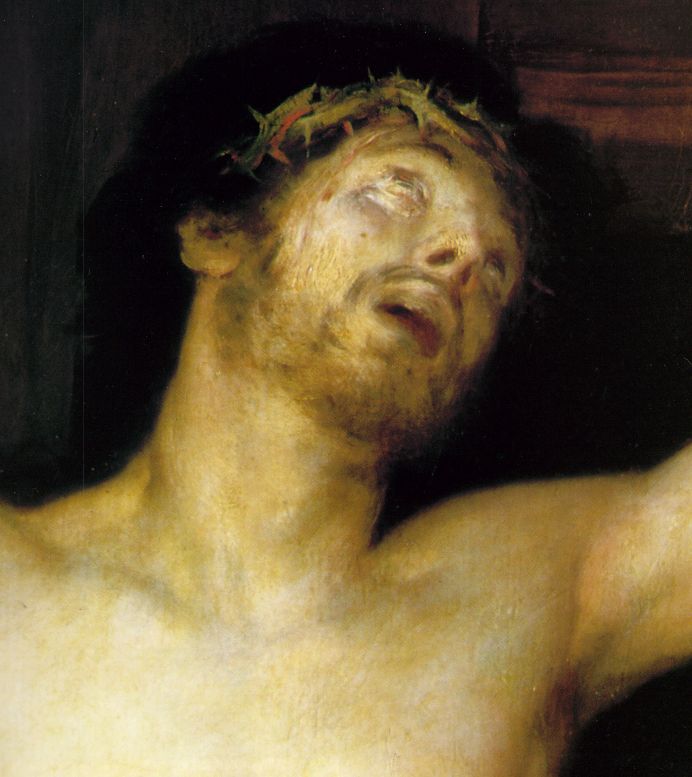The theory of penal substitutionary atonement states that Jesus Christ, the incarnate Son of God, took the punishment that we deserve. Some suggest that if Christ takes the punishment we deserve, then he must take the same (or identical) punishment we deserve. This thought generates an objection to the penal substitutionary theory of the atonement. The argument is something like: If we deserve eternity in hell, then, in order to take our punishment, Christ must spend eternity in Hell. Christ does not spend eternity in Hell. Therefore, we do not deserve eternity in Hell There is good reason to reject this argument. The first thing to notice is that this argument…
-
-
What is the Meaning of the Cry of Dereliction?
On the cross, the Messiah cries, “Eli, Eli, lama sabachthani?” that is, “My God, My God, why have You forsaken Me?” (Matthew 27:46b). His words are a quotation of David’s prophetic psalm, psalm 22. But what can Jesus possibly mean? How could the Son be forsaken by the Father? How do we explain the Messiah’s question? Surely he of all people knows why he is on the cross. The answer lies in an understanding of Psalm 22. Under the inspiration of the Holy Spirit, in the first verse, David gives the Messiah his script. His cry is a forlorn cry of dereliction: My God, my God, why have You forsaken…
-
The Tragedy of a Worshipless Life
The tragedy of a lifeless body is only matched by the tragedy of a worshipless life. A worshipless life is a life lived without worshiping the King, the Messiah, Jesus. In the gospels, this tragedy brings the Lord to tears and anguish over his people. In every other encounter with human misery, the Lord stoops in compassion and heals, delivers, and forgives. But his anguish is reserved for those whose lips cannot sing a song of praise to their King. Matthew 21 – 23 records Jesus’ encounter with those who cannot worship their king. Jesus enters his city as the rightful heir to the throne of David. He is praised…
-
Why I Love the Wrath of God
Read the following excerpt from theologian, Arthur Pink. It is about the wrath of God. The wrath of God is his eternal detestation of all unrighteousness. It is the displeasure and indignation of divine equity against evil. It is the holiness of God stirred into activity against sin. It is the moving cause of that just sentence which he passes upon evildoers. God is angry against sin because it is a rebelling against his authority, a wrong done to his inviolable sovereignty. Insurrectionists against God’s government shall be made to know that God is the Lord. They shall be made to feel how great that Majesty is which they despise, and how…
-
The Humiliation of the King
When most people get close to people of power and influence, they feel something. I’m not entirely sure what it is, but the best answer I can come up with is that powerful people are compelling because their power promotes our status. The closer we are to them, the higher our status is. This morning we are going to look at Jesus’ teaching on status in the kingdom in Matthew 20:17-34. In this text, Jesus receives two very different requests–one for status and the other for mercy. He teaches his disciples that he has come not to be the powerful status-elevator, but the humiliated servant who lays down his life…
-
Atonement and Punishment: A Defense of Retribution
Here is a common argument against the penal substitutionary view of the atonement: The penal substitutionary view of the atonement entails a retributive view of punishment, but retribution is insufficient moral justification for punishment. Therefore, the penal substitutionary theory of the atonement is false. In response, I shall argue that the retributive justification of punishment is well supported by the Bible and by commonly held intuitions about meritorious actions. The penal substitution view of the atonement holds that sinful human beings deserve divine punishment and that Jesus Christ was punished in their place. According to this view, punishment is deserved by a sinner but can be absorbed by someone other…
-
Is the Ordo Salutis Intelligible?
The ordo salutis (order of salvation) is supposed to tell us about the logical order of God’s decree to save some people and not other people. There are differing versions of the order and this fact has led to some of the deepest divisions in the church. Some think God determined whom to save before he decreed the means for their salvation. Others think that God’s decree to save some people came after his decree to permit them to sin. The important feature of the order is that it is not supposed to be a temporal order. Supposedly, God logically orders his decrees without temporally ordering them. The trouble is I…
-
Review: The Race Set Before Us: A Biblical Theology of Perseverance & Assurance by Thomas Schreiner and Ardel Caneday
Thomas Schreiner and Ardel Caneday are both New Testament scholars who are deeply committed to pastoral ministry. Schreiner was a pastor for fourteen years and now serves as Professor of New Testament at The Southern Baptist Theological Seminary. Caneday serves as a pastor and is Professor of New Testament studies at Northwestern University. In The Race Set Before Us: A Biblical Theology of Perseverance and Assurance, Schreiner and Caneday defend a Calvinistic view of the perseverance of the saints: It is not possible for a person who is a genuine believer to lose their status as a divinely elected person. The alternative position to this view states that a person…


